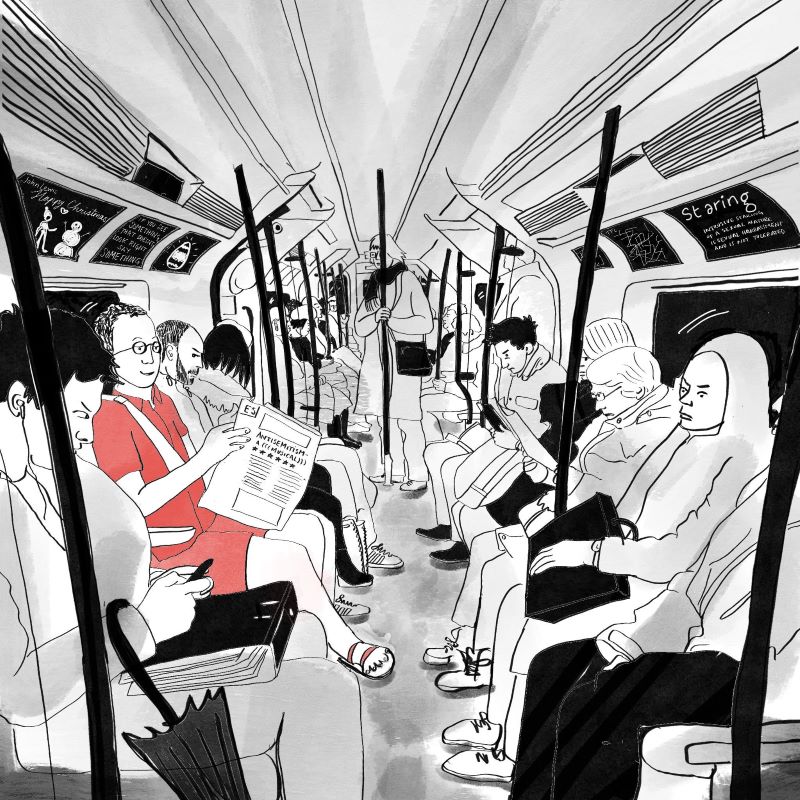By Lewis MacLean.
A show about antisemitism is always going to be important. The thought of trekking across Southampton in a storm did not seem appealing but the timing, with global events, seemed to add some weight to the event too. Although this evening’s performance was more about society than politics.
The location was God’s House Tower; a rustic medieval chapel on a cold rainy winter night facing the south coast of England. With storm Ciaran pending; I saw the tall trees outside being whisked around by the high winds in a frenzy of nature that in hindsight, foreshadowed the energy of the performance ahead aptly. You probably could not have asked for a more atmospheric setting.
The synopsis of Antisemitism: a (((musical))) is defined for clarity as “the story of an Israeli Jew’s first24 hours on British soil “. The performance goes further though, with passing critiques of British culture and sadly, an all too familiar Antisemitism inherent within it.
Throughout the show photos of actual social media Tweets were broadcast on a screen revealing some of the darkest (and it has to be said stupidest) things said online, all soaked in the distinctive patterns of antisemitic rhetoric.
The usual Covid conspiracy references to Bill Gates or George Soros were tell-tale signs of the new wave of post-QANON era conspiracy theorists who restocked history with new antisemitic tropes.
Antisemitism: a (((musical))) was smart, direct and informative but the secret to its success was in not being hard to understand. It has a great sense of humour which was really valuable.
The songs in the play tonight are not only quality compositions in their own right but they have sharp and witty lyrics with a dry humour. The musical revelry was made possible by the visible impressive musical talent of David Merriman and Oli George Raw on keyboards with backing vocals sporadically chipping in as part of the structure of the play. This served as quite a nice Brechtian technique to break passive observance with renewed active thought and concentration. Later on we were treated to another example when narrators Hannah Bristow and Amy Parker broke out of their characters into a convincing skirmish that still has me wondering if they were acting or not. The narrator Amy, left to defend her self-referenced fictional character that served as both a comedy device and not so subtle alibi to reactionary politics gone wrong. For a fictional character it felt very familiar.
The shared talents of protagonist Maya Kristal Tenenbaum and dual narrators Amy Parker and Hannah Bristow lit up the room. The timing and rhythm of the interactions and banter between these three budding actors was so natural and effortless you would think they are three sisters in a travelling family stage show. A female Marx Brothers. Where Maya’s performance carried the main story arc, it was complemented by Hannah’s stealth quips and Amy’s hilarious comebacks. The shared burden of bringing the emotional reality of antisemitism fell on all their shoulders to bring home. The Writer and Composer Uri Agnon and Director Emma Jude Harris were also in presence amongst the crowd bringing a strong intimate team effort into the room.
Overall this musical was upbeat, funny, smart and you will struggle to hear a song about the IHRA (International Holocaust Remembrance Alliance) without your foot tapping anywhere else. It wasn’t unbridled joy and laughter all the way through. At times the humour seemed so dry and sardonic so I wasn’t sure I should be laughing and I had to look around to the other audience members for social cues. Maybe this is the point. Maybe this is what it feels like when you are an individual trying to survive in an antisemitic society.
Somewhere in the dialogue I thought I heard the phrase ‘wheel of history’ used. This had some gravitas when viewing the subject of antisemitism in a historical context which is actually necessary to understand antisemitism in its entirety, not just the last century. It is an older and craftier prejudice that has had an almost seemingly eternal social capital behind it throughout the last millennia.
Of course, everyone came to the show with an awareness of the horrors unfolding in Israel/Gaza but this show was about British society, not global politics – a very important distinction to make.
I am not a fan of musicals but I am a fan of offbeat and thought provoking theatre that goes against the grain, which is what this succeeds in being.
- In Common is not for profit. We rely on donations from readers to keep the site running. Could you help to support us for as little as 25p a week? Please help us to carry on offering independent grass roots media. Visit: https://www.patreon.com/incommonsoton
You may also like:
Interview: Uri Agnon on his new show, Antisemitism: a (((musical)))

